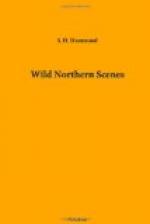“Well,” said Spalding, resuming his narrative, “some fifty years ago, two enterprising men (brothers) marched into the woods in the town of Mexico, now in Oswego county, with their axes on their shoulders, and stout hearts beating in their bosoms. They located a mile or more apart, and began a warfare, such as civilization wages, against the old forest trees. Men talk about courage on the battle-field, the facing of danger amid the conflict of armed hosts, and the crash of battle. All that is well, but what is such courage, stimulated by excitement and braced by the ignominy which follows the laggard in such a strife, to that calm, enduring, moral courage of him who encounters the toil and hardships incident to the settlement of a new country, and battles with the dangers, the long years of privation, which lie before the pioneer who goes into the forest to carve out a home for himself and his children? How much more noble is such courage, how infinitely superior is such a warfare, one which mows down forest trees instead of men, which creates green pastures, broad meadows, and fields of waving grain, instead of smouldering cities, and desolated homes! How much more pleasant is the sound of the woodman’s axe, than that of the booming cannon! How much more cheerful the smoke that goes up from the burning fallow, than that which hangs in darkness over the desolation of the battle field, beneath which lie the dead in their stillness, and the wounded in their agony! But I am losing sight of the bear.”
“Exactly so,” said the Doctor; “and we have not as yet had the pleasure of making his acquaintance. Suppose you give us an introduction to the gentleman.”
“These interruptions are entirely out of order,” gravely remarked Smith; “they must not be repeated. The counsel will proceed.”
“Well,” resumed Spalding, bowing deferentially to the court, “one of these settlers started one day across the woods to visit his brother. There were few roads in those times, and these were laid out without much reference to distance; they went winding and crooking every way to avoid this hill, or that creek, or water course, or any other impediment which nature may have thrown in the way, and a blind footpath, or a line of marked trees, was more commonly travelled from one forest house to another. The forester was tramping cheerfully along, thinking doubtless of the good time coming, when his farm would be shorn of all its old woods, when flocks and herds would be grazing in luxurious pastures, tall grain waving in fields, the summer grass clothing in richness meadows reclaimed by his labor from the wilderness, and he should be at ease among his children. First settlers of a new country think of these things, and it is because they think of them, that their hearts are strong and buoyant with hope. They live in the future, enduring the darkness and privation of the present, in their faith in the brightness of the years to come. Thus they wait in patience for,




